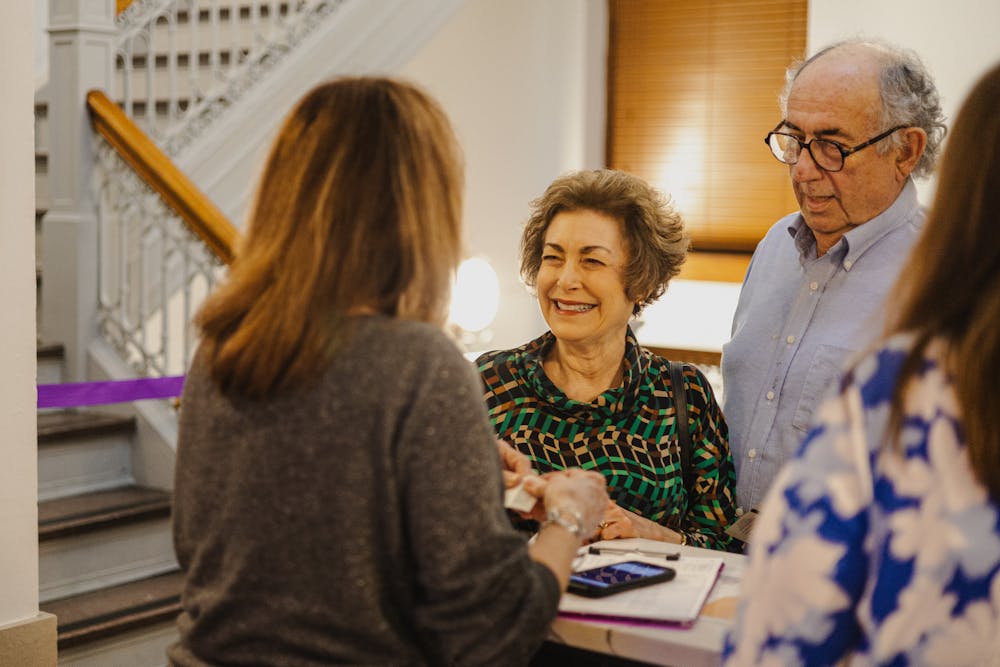Anybody who says “no man is an island” clearly hasn’t seen the family dynamics of the Tony award-winning musical, “Next to Normal.”
Family dynamics are only one of the issues the musical tackles, presenting a challenge for creative director Stephanie Lynge when the Hippodrome Theatre, located at Southeast Second Place, added the production to its 2024 lineup. Premiering Friday, “Next to Normal” will be shown through Feb. 25.
“[The show] deals with mental health issues,” she said. “That and the word ‘musical’ are not generally two things you think of together.”
Despite the unexpected pairing, Lynge said the play has opened doors for candid discussions since its opening in 2008.
“It is a way … to be able to talk about mental health with less of the stigma that we still have about it as a society,” she said.
In her role as creative director, Lynge has guided the actors and designers with a single key idea.
“It is about flawed people doing their best, which isn’t always enough,” she said. “And sometimes that’s OK too.”
Those flawed people include Diana, a woman with bipolar disorder, her husband Dan, daughter Natalie and deceased son Gabe. Henry, Natalie’s classmate who later becomes her boyfriend, is caught in the web of complicated family dynamics upon his introduction to Natalie’s parents.
In addition to ideas she sought to convey in the story, Lynge wanted to avoid harmful or stereotypical portrayals of mental illness.
“Our goal is to tell this story as honestly as we possibly can without putting an assumed spin on something,” she said.
Noah Yager, a 21-year-old UF musical theater senior, said he felt the pressure of his role in the show. Yager plays Henry, one of the only characters without outward signs of mental illness.
“This is a novel kind of experience as far as rehearsal goes because I don’t think I’ve ever been in a show of this caliber of content,” he said.
Efforts to play the characters accurately were supported by consultation with mental health experts in Gainesville, including psychiatrists at Shands Hospital.
“We brought in psychiatrists and counselors that deal with this kind of mental illness and people who have experienced family members or relatives with this kind of illness,” he said.
The counselors emphasized the actors needed to protect their own mental health as well, a priority shared by Josslyn Shaw, the 24-year-old actress who plays Natalie.
Shaw first played Natalie in 2021 in a production of “Next to Normal” in New Jersey, an experience she sought not to repeat.
“The last time I played this role, it was really hard for me to step away from it because I was experiencing so much of the sadness in my real life,” she said.
Instead of getting caught up in the demanding rehearsal schedule, Shaw said she is devoted to appreciating the beauty of every moment she has on stage.
“This time around, it’s important to note the joys in the rehearsal process and in the show when you’re in it too,” she said.
The show’s sensitive material includes suicidal ideation and substance abuse. Stella Jones, a 26-year-old caretaker, said she found it easy to find the joy in the show when she saw the first night of previews Jan. 24.
“Every last thing I saw on that stage tonight felt like it came directly from my memories,” she said.
Jones grew up in Newberry with her mother, who she said dealt with severe bipolar disorder her entire life.
“The fights between Diana and Natalie were mirror images of the fights I had with my mom,” Jones said. “I constantly wanted to tear my own hair out because she seemed dead set on never getting any better.”
Jones said seeing a musical portray her childhood trauma so accurately was gratifying.
“It showed me that I was right to feel sad and frustrated all those years, even when it felt like nobody was listening,” she said. “It also made me feel a lot of sympathy for my mom. Bipolar is so hard and I know she was trying her best, even when it didn’t look like it to me.”
Performing as Natalie in her second show now has taught her countless lessons. The one Shaw believes is most important is people need to understand their emotions before they can work through them.
“You just can’t keep pushing it or it’s just going to get worse,” she said. “Sometimes you have to embrace the darkness a little bit to find the light.”
Contact Bea Lunardini at blunardini@alligator.org. Follow her on X @bealunardini.






